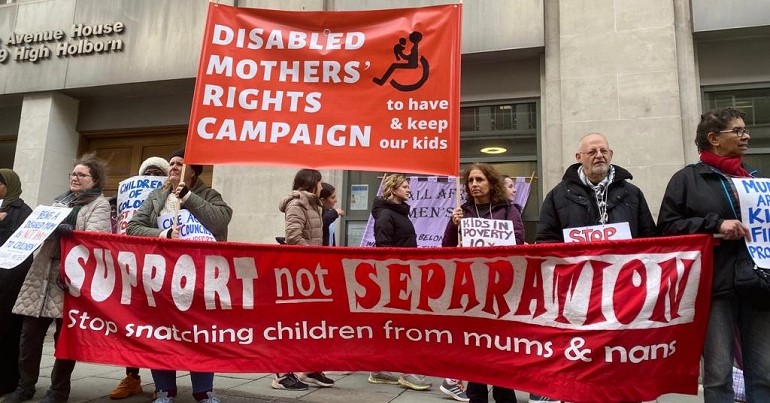Shared from the Canary 1 March 2023 — part one of three reports by Steve Topple — thank you!
A protest just highlighted how adoption is the state-sanctioned, forcible removal of children from marginalised women

This is the first in a three-part series looking at adoption in the UK, focusing on marginalised mothers and caregivers.
The state’s adoption of children has effectively become an industry in recent years. However, not all mothers and caregivers are subject to social services taking their children from them. This is because the state is disproportionately targeting women the system marginalises – be it due to ethnicity, class, disability, or chronic illness. It shows that systemic racism, ableism and classism pervades a service that is supposed to support children, not snatch them from their mothers. And the driver for all this is private profit.
Support not Separation
Support not Separation is a coalition of organisations. It fights for the right of mothers and primary caregivers against social services and courts. Specifically, Support not Separation deals with adoption and forced separation, which is when these institutions attempt to remove children from mothers. It says on its website that:
We are a coalition of organisations and individuals who have experienced or witnessed the damage caused by the forced separation of children from their mother or other primary carer and are determined to change this desperate situation.
Once a month, on the first Wednesday, the group protests outside the Central Family Court in London. On 1 March it was there again – as well as holding a “virtual” protest online. Support not Separation specifically focuses on the intersections within adoption – like class and disability:
The group also highlights the inherent misogyny that exists in the system, and how it ignores domestic violence from men:
However, crucially, the group also focuses on how the system forces so many adoptions to take place without mothers’ consent:
Other campaign groups are involved. WinVisible is a group for women living with visible and invisible disabilities. It highlighted that it was the sixth anniversary of the protest:
At the heart of Support not Separation’s work, though, is the state of adoption services in the UK and how they fail women and children.
Adoption: a state-run industry
Adoption in the UK is effectively a state-run industry, with private companies making hundreds of millions in profit. However, all too often adoption is no longer in the child’s best interests. Nor are they adopted with the mother’s explicit consent. It is now driven by profit motives and underscored by racism, prejudice, and classism. It’s unsurprising when the value of a child to these private companies is around £100,000.
As Cherry Casey wrote for Prospect in October 2022, “forced adoptions are not in the past”:
The UK is unusual, compared to the rest of Europe, for the frequency of forced adoptions. Exact statistics are difficult to pin down, but data from 2014 suggests that almost half of the 5,050 children adopted in the previous year were given new homes without their parents’ consent. In England alone, 80,000 children were removed from their parents in the year up to March 2021. Of those, 4,600 had a “placement order granted” for their removal. The context behind the removal of the remaining 76,000, is less clear.
According to Alexandra Conroy Harris, a legal consultant for CoramBAAF… this means the removals “will almost certainly have been made without the consent of the child’s parents.” The 2021 data also shows that of 2,270 children “placed in adoption,” only 290, or 13 per cent, were adopted “with consent”.
This is not news to Support not Separation. It conducted research in 2021 based on 219 mothers and 411 children involved in family court cases (for example custody battles or fighting against social services). The group said that:
Over half the mothers had had their children taken from them (a significant increase from 2017). In 30% of cases the children were living with the abusive father; 14% had children in foster care. And 10% had children adopted without their consent. This shocking figure gives lie to the idea that forced adoptions are historic, they are in fact a present-day policy of punishment and social cleansing
However, behind the figures is the core of the issue: social services are disproportionately targeting marginalised mothers. Within in this pervades a culture dominated by systemic misogyny, racism, ableism and classism.
Parts two and three in this series will be looking at the intersections of these issues – and how adoptions are driven by companies’ profit motives, not children, and mothers’ and caregivers’ wellbeing.
Featured image via the Disabled Mothers’ Rights Campaign


2 thoughts on “Protest against state-sanctioned forced adoptions”